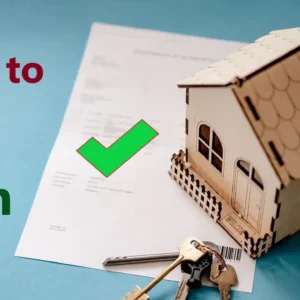If you’re looking to buy a home but your credit score is holding you back, don’t worry – there are options available. The Federal Housing Administration (FHA) offers loans to people with lower credit scores and smaller down payments than traditional lenders require.
In this article, we’ll take a closer look at FHA loans, how they work, and what you need to know before applying for one.
What is an FHA loan?
An FHA loan is a mortgage that’s insured by the Federal Housing Administration. The FHA doesn’t actually lend you the money – instead, they insure the loan to protect the lender if you default on the payments.
Because the FHA is backing the loan, lenders are more willing to offer them to people with lower credit scores and smaller down payments. This makes FHA loans a great option for people who might not be able to get a traditional mortgage.
How do FHA loans work?
FHA loans work similarly to traditional mortgages, but there are a few key differences. Here’s what you need to know:
Lower credit score requirements:
With an FHA loan, you can typically qualify with a credit score as low as 500. However, you’ll need a score of at least 580 to qualify for the lowest down payment amount (which we’ll talk more about in a minute).
Smaller down payments:
Traditional lenders typically require a down payment of at least 20% of the home’s purchase price. With an FHA loan, you can put down as little as 3.5%. Keep in mind that putting down less than 20% means you’ll have to pay mortgage insurance, which protects the lender if you default on the loan.
Higher debt-to-income ratios:
With an FHA loan, you can have a higher debt-to-income ratio (DTI) than you would with a traditional mortgage. Your DTI is the percentage of your monthly income that goes toward debt payments. Generally, lenders prefer a DTI of 43% or lower. However, with an FHA loan, you may be able to qualify with a DTI as high as 50%.
What are the benefits of an FHA loan?
There are several benefits to getting an FHA loan, including:
Lower credit score requirements:
As we mentioned earlier, FHA loans are a great option if your credit score isn’t as high as you’d like it to be.
Smaller down payments:
With an FHA loan, you can put down as little as 3.5% of the home’s purchase price, which can be a huge help if you’re struggling to save up for a larger down payment.
Higher debt-to-income ratios:
With an FHA loan, you may be able to qualify with a higher DTI than you would with a traditional mortgage. This can be helpful if you have other debts (like student loans) that are eating into your monthly income.
Lower closing costs:
Because FHA loans are backed by the government, lenders may be willing to offer lower closing costs than they would for a traditional mortgage.
What are the drawbacks of an FHA loan?
While FHA loans offer some great benefits, there are also a few drawbacks to keep in mind:
Mortgage insurance: If you put down less than 20% with an FHA loan, you’ll have to pay mortgage insurance. This can add a significant amount to your monthly mortgage payment.
Lower loan limits: FHA loans have lower loan limits than traditional mortgages. In 2021, the limit for a single-family home is $356,362 in most areas (though it can be higher in some high-cost areas).
Property requirements: To qualify for an FHA loan, the home you’re buying must meet certain requirements. For example, it must be your primary residence and it must meet certain safety and livability standards.
How to qualify for an FHA loan?
To qualify for an FHA loan, you’ll need to meet certain requirements. Here’s what you need to know:
Credit score: While the minimum credit score for an FHA loan is 500, you’ll need a score of at least 580 to qualify for the lowest down payment amount (3.5%). Keep in mind that individual lenders may have their own credit score requirements.
Down payment: With an FHA loan, you can put down as little as 3.5% of the home’s purchase price. However, if your credit score is below 580, you’ll need to put down at least 10%.
Income: You’ll need to have a steady income to qualify for an FHA loan. Generally, lenders prefer to see two years of steady employment (though there are exceptions). You’ll also need to provide proof of income, such as pay stubs or tax returns.
Debt-to-income ratio: As we mentioned earlier, FHA loans allow for a higher debt-to-income ratio than traditional mortgages. However, lenders will still want to see that you have enough income to cover your monthly debt payments.
Property requirements: The home you’re buying must meet certain requirements to qualify for an FHA loan. For example, it must be your primary residence, it must meet certain safety and livability standards, and it must be appraised by an FHA-approved appraiser.
How to apply for an FHA loan
To apply for an FHA loan, you’ll need to follow these steps:
Find an FHA-approved lender:
Not all lenders offer FHA loans, so you’ll need to find one that does. You can search for FHA-approved lenders on the HUD website.
Gather your documents:
You’ll need to provide documentation to your lender, including proof of income, bank statements, and tax returns.
Get pre-approved:
Before you start house hunting, it’s a good idea to get pre-approved for an FHA loan. This will give you an idea of how much you can afford to borrow, which can help you narrow down your search.
Find a home:
Once you’re pre-approved, you can start looking for a home that meets the FHA’s requirements.
Apply for the loan:
Once you’ve found a home you want to buy, you’ll need to apply for the loan with your lender. They’ll review your application and let you know if you’ve been approved.
Close on the loan:
If you’re approved for the loan, you’ll need to close on it. This involves signing a lot of paperwork and paying closing costs.
Tips for getting approved for an FHA loan
If you’re interested in getting an FHA loan, here are a few tips to help you get approved:
Improve your credit score:
While the minimum credit score for an FHA loan is 500, you’ll need a score of at least 580 to qualify for the lowest down payment amount (3.5%). If your credit score is lower than 580, work on improving it before applying for an FHA loan.
Save up for a down payment:
While you can put down as little as 3.5% with an FHA loan, putting down more can help you qualify for a larger loan amount and lower your monthly mortgage payments.
Pay off debts:
While FHA loans allow for a higher debt-to-income ratio than traditional mortgages, lenders still want to see that you have enough income to cover your monthly debt payments. Paying off debts can help improve your chances of getting approved.
Choose the right lender:
Not all lenders offer FHA loans, so make sure you choose one that does. You may also want to shop around to find the best interest rates and closing costs.
Be patient:
Applying for a mortgage can be a long and sometimes frustrating process, but it’s important to be patient and stay organized. Make sure you have all the necessary documents ready to go, and be prepared to provide additional documentation or answer questions as they come up.
Drawbacks of an FHA loan
While there are many benefits to getting an FHA loan, there are also some drawbacks to consider:
- Mortgage insurance: FHA loans require mortgage insurance, which can increase your monthly mortgage payment.
- Limits on loan amounts: FHA loans have limits on how much you can borrow, depending on where you live and the type of property you’re buying.
- Property requirements: The home you’re buying must meet certain requirements to qualify for an FHA loan, which can limit your options.
- Upfront costs: There are upfront costs associated with getting an FHA loan, including appraisal fees, inspection fees, and closing costs.
- Refinancing restrictions: If you have an FHA loan, you may not be able to refinance it into a conventional mortgage without paying off the loan in full.
Conclusion
If you’re a first-time homebuyer or have a lower credit score, an FHA loan may be a good option for you. With lower credit score and down payment requirements, FHA loans make it easier to afford a home and qualify for a mortgage. However, there are also drawbacks to consider, including mortgage insurance and limits on loan amounts. Before applying for an FHA loan, make sure you understand the requirements and benefits so you can make an informed decision about whether it’s the right option for you.






